See also
| Anti-nuclear movement |
|---|
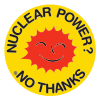 |
| By country |
| Lists |
The late 1950s and early 1960s saw a strong push from the Spanish Government to establish a national nuclear power industry. In response to the surge in nuclear power plant plans, a strong anti-nuclear movement emerged in 1973, which ultimately impeded the realisation of most of the projects. [1]
Conflict concerning the Lemóniz Nuclear Power Plant in the Basque province of Vizcaya was one of the major anti-nuclear issues in the 1970s and 1980s. Influenced by the terrorist group ETA, who killed some workers, [2] including the industrial engineer José María Ryan, [3] the socialist government approved a moratorium in late March 1984, and ultimately only ten of the 37 originally planned commercial nuclear reactors were built in Spain. Since the liberalisation of the electricity market, no new nuclear power plant has been planned in Spain. [1]
The unresolved question of long-term disposal of high-level radioactive waste has been a contentious issue. Compared to other European Union countries, Spanish citizens generally show more negative attitudes towards the use of nuclear power. [1]
As of 2017 Spain has extended the life of the Almaraz Nuclear Power Plant and a nuclear storage facility will be built according to the Spanish secretary of State for the EU Jorge Toledo Albiñana, stating work will start regardless of Portugals complaints, and uranium bars that will remain radioactive for the next 300 years will be stored on site. [4]
| Anti-nuclear movement |
|---|
 |
| By country |
| Lists |
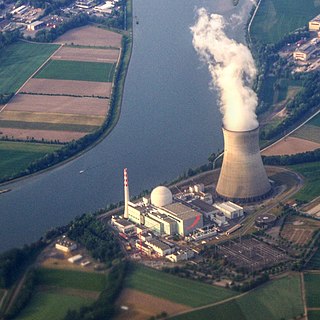
Nuclear power is the use of nuclear reactions to produce electricity. Nuclear power can be obtained from nuclear fission, nuclear decay and nuclear fusion reactions. Presently, the vast majority of electricity from nuclear power is produced by nuclear fission of uranium and plutonium in nuclear power plants. Nuclear decay processes are used in niche applications such as radioisotope thermoelectric generators in some space probes such as Voyager 2. Generating electricity from fusion power remains the focus of international research.

Josep Borrell Fontelles is a Spanish politician serving as High Representative of the Union for Foreign Affairs and Security Policy since 1 December 2019. A member of the Spanish Socialist Workers' Party (PSOE), he served as President of the European Parliament from 2004 to 2007 and as Minister of Foreign Affairs, European Union and Cooperation in the Government of Spain from 2018 to 2019.
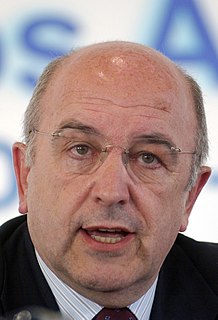
Joaquín Almunia Amann is a Spanish politician and formerly, prominent member of the European Commission. During his tenure in the two Barroso Commissions, he was European commissioner responsible for economic and monetary affairs (2004–2009) and, subsequently, vice-president and the European Commissioner for Competition (2009–2014). Previously, he had been Spanish Minister for Employment (1982–1986) and Public Administrations (1986–1991). From 1997 to 2000, he was the leader of the opposition as secretary general of the Spanish Socialist Workers' Party, standing in and losing the 2000 Spanish general election against the then incumbent Spanish prime minister, José María Aznar.
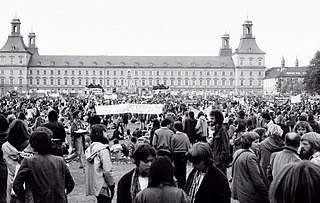
The anti-nuclear movement is a social movement that opposes various nuclear technologies. Some direct action groups, environmental movements, and professional organisations have identified themselves with the movement at the local, national, or international level. Major anti-nuclear groups include Campaign for Nuclear Disarmament, Friends of the Earth, Greenpeace, International Physicians for the Prevention of Nuclear War, Peace Action and the Nuclear Information and Resource Service. The initial objective of the movement was nuclear disarmament, though since the late 1960s opposition has included the use of nuclear power. Many anti-nuclear groups oppose both nuclear power and nuclear weapons. The formation of green parties in the 1970s and 1980s was often a direct result of anti-nuclear politics.
Iraultza was a small Basque militant armed group of leftist tendency, active between 1982 and 1996 as a response to the suppression of the Basque resistance movement. It was thought to be a group of less than 50 people based in Bilbao, largely focused on the destruction of property, particularly those of American multinational corporations and against other smaller Spanish companies involved in labor disputes, in support of Workers' self-management and mobilization, although one of its attacks was responsible for the death of one individual and several for minor injuries of others. According to newspaper El País it was thought to be responsible for over 210 attacks during its existence.

New Force was the name of a far-right political party in Spain founded by Blas Piñar, director of the Institute of Hispanic Culture and longtime procurador in the Cortes Españolas during the Francoist period. Originally operating as a publishing house, FN sought to preserve Francoism in Spain during the transition to democracy. After its dissolution as a political party in 1982, it continued to operate as a publishing house under the same name, and its political activities and stylings were succeeded by the National Front party.

Lemóniz Nuclear Power Plant is an unfinished nuclear power plant in Lemoiz, in the Basque province of Bizkaia, Spain. Its construction stopped in 1983 when the Spanish nuclear power expansion program was cancelled following a change of government. Its two PWRs, each of 900 MWe, were almost complete but were never operated.
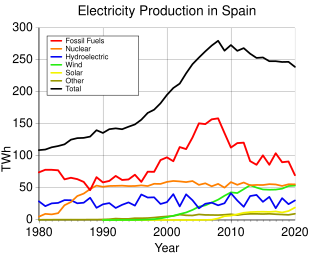
Spain has five active nuclear power plants with seven reactors producing 21% of the country's electricity as of 2013.
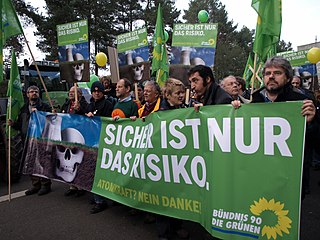
The anti-nuclear movement in Germany has a long history dating back to the early 1970s when large demonstrations prevented the construction of a nuclear plant at Wyhl. The Wyhl protests were an example of a local community challenging the nuclear industry through a strategy of direct action and civil disobedience. Police were accused of using unnecessarily violent means. Anti-nuclear success at Wyhl inspired nuclear opposition throughout Germany, in other parts of Europe, and in North America. A few years later protests raised against the NATO Double-Track Decision in Germany and were followed by the foundation of the Green party.
Nuclear power in the European Union accounted for approximately 26% of total electricity production in 2019 and nearly half of low-carbon energy production across the EU.

The nuclear power debate is a long-running controversy about the risks and benefits of using nuclear reactors to generate electricity for civilian purposes. The debate about nuclear power peaked during the 1970s and 1980s, as more and more reactors were built and came online, and "reached an intensity unprecedented in the history of technology controversies" in some countries. Thereafter, the nuclear industry created jobs, focused on safety, and public concerns mostly waned.

Energy in Uruguay describes energy and electricity production, consumption and import in Uruguay.
The use of nuclear energy in Uruguay is prohibited by law 16.832 of 1997. Despite this, the country has several institutions that regulate its use, such as the Center for Nuclear Research or the National Regulation Authority on Radiological Protection.
The China Fusion Engineering Test Reactor is a proposed tokamak fusion reactor, which uses a magnetic field in order to confine plasma and generate energy. Presently, tokamak devices are leading candidates for the construction of a viable and practical thermonuclear fusion reactor. These reactors may be used to generate sustainable energy whilst ensuring a low environmental impact and a smaller carbon footprint than fossil fuel-based power plants.

Gladys del Estal Ferreño was a ecologist activist from San Sebastián, Gipuzkoa, Spain. She was killed by a bullet shot at her by the Guardia Civil during a protest in Tudela, Navarre, against the nuclear station construction program for the Basque Country, and the aircraft firing range of Bardenas. She has since become an important icon of the ecologist movement.
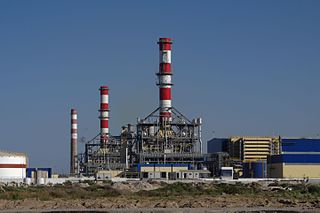
The energy sector in Tunisia includes all production, processing and, transit of energy consumption in this country. The production involves the upstream sector that includes general oil and gas, the downstream sector that includes the only refinery in Tunisia and most of the production of natural gas, and varied electrical/renewable energies. Renewable energy has been a strong point of focus for Tunisia as they look to optimize their green energy sources and advance their developing country. The Tunisian government has partnered with Russia and France in hopes of establishing nuclear energy as a viable alternative to fossil fuels and taking up a nontrivial chunk of the energy production in Tunisia. This is expected to be accomplished in the 2020's.
Jesús María Pedrosa Urquiza .He was a Spanish politician victim of terrorism of ETA.
José Ignacio Iruretagoyena was a Spanish politician and victim of terrorism of the Basque separatist group Euskadi Ta Askatasuna (ETA).
Púnica case is the name given to the police operation carried out by the Central Operational Unit (UCO) of the Guardia Civil, at the request of the judge of the Spanish National Court, Eloy Velasco.
The Catalan People's Army, known by its members as La Casa, was a Catalan nationalist paramilitary group which existed during the 1970s.